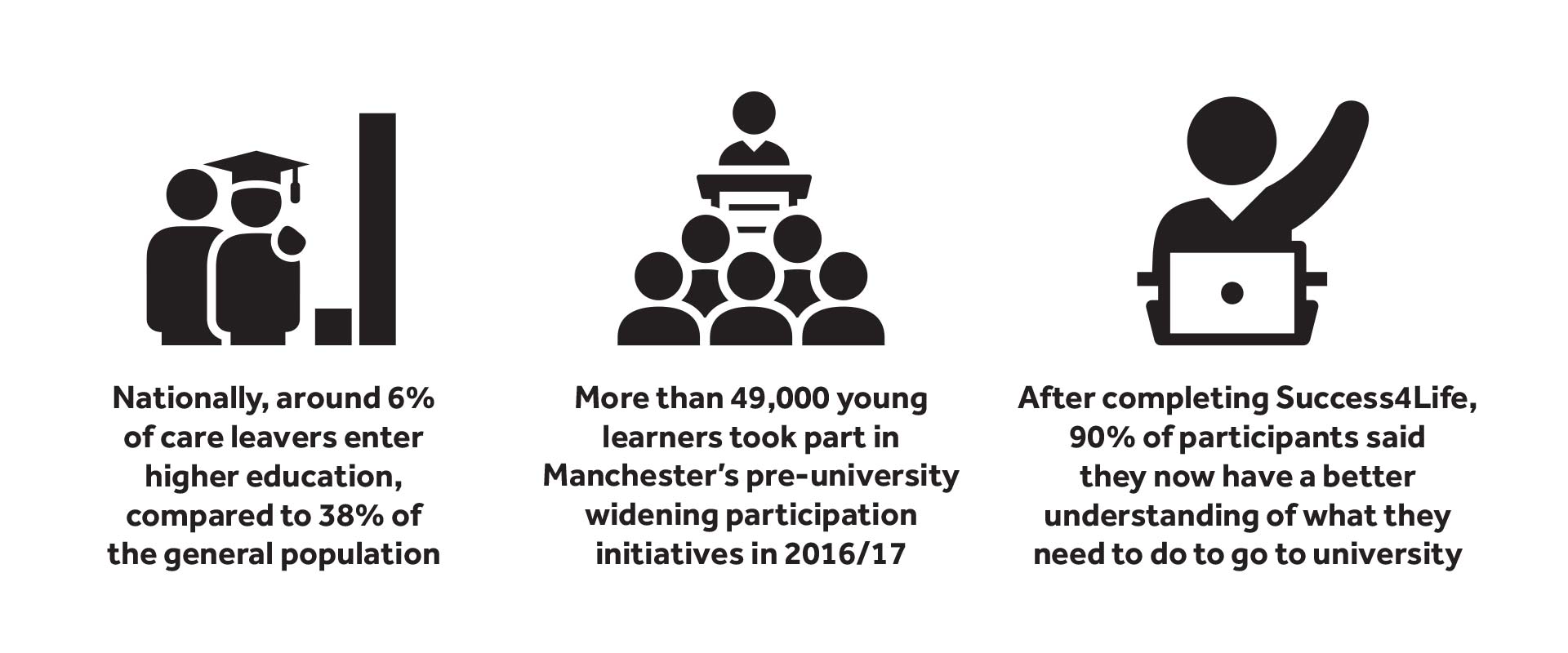"People sometimes think: ‘Oh, you’re in care; you’re not as clever as others.’
"I always knew that wasn’t true. But when I started school I was two years behind everyone. It can be harder for us."
In these few sentences, 13-year-old Tamara sums up why The University of Manchester’s Success4Life programme – which she participated in last year – was established. Part of the University’s extensive widening participation offer, Success4Life focuses on looked-after children from Years 7 to 11 in Greater Manchester.
The power of suggestion
Nationally, around 6% of care leavers enter higher education, compared to 48% of the general population. University Chancellor Lemn Sissay, who personally experienced Wigan’s care system 40 years ago and has since worked extensively to advocate for looked-after children, is unsurprised by these statistics.
"Sadly, kids in care are often merely seen as a problem to be dealt with until they’re 18," says Lemn. "A lot of these young people are then set adrift in adult life. Many even end up in prison.
"Family gives you the power of suggestion. Simply having a parent introduce university as an option is something many children in care don’t have. They need somebody to care enough to raise the bar for them."
Raising aspirations
More than 49,000 young learners took part in Manchester’s pre-university widening participation initiatives in 2016/17, all of which encourage learners from less advantaged backgrounds to discover more about higher education, consider it as a viable option and prepare for further study. Support provided by the University for care leavers includes a designated contact for the student and a donor-funded scholarship worth £1,000 a year.
Success4Life aims to boost abilities as well as aspirations, running a series of activities over ten weeks designed to improve lifelong skills and attributes such as teamwork, confidence and self-image.
"I really enjoyed the cooking class," recalls Tamara with a smile. "We made pasta salad – yum!
"And we had to work in teams. I met two new people that way; we became good friends. "I don’t like meeting new people. But on Success4Life they taught us how to communicate better. And everyone had something in common; we’d all been in care."
Lemn believes the programme’s exclusivity for looked-after children is important. "Some people worry about treating these kids differently," he says. "But being in care is different; it can be such an isolating experience. These initiatives aren’t about separation; they’re about safety, growth, providing a healthy environment of support."

Success4Life helped me believe in my dreams.
Realising the potential of children in care
Tamara has been with her current carer, Al, for four years – and he believes the programme has had a real impact. “It’s really benefited Tamara,” he claims. “Just listening to her talk to you – that would never have happened before this course. We’d have been chasing her just to sit down with you!”
It’s hard to imagine: today’s Tamara is a bright, chatty teenager who smiles frequently and makes eye contact easily as she talks about her plans to go to university and eventually become an actor.
“Success4Life didn’t change my plans,” she says.“But before it I thought, I want to be an actress. And after it I thought, I can be an actress. It helped me believe in my dreams.”
“Maybe Tamara was always capable of this,” acknowledges Al. “But we all saw the change after Success4Life. Perhaps it just released her potential.”
After completing Success4Life, 90% of participants said they now have a better understanding of what they need to do in order to go to university. But perhaps this notion that it 'releases potential’ is even more important.
As Lemn concludes: “It’s not about whether children in care should go on to university. It’s about making sure they have the choice of whether to go or not.
“These education initiatives are shining a light on the most vulnerable in our society,” he adds. “I’m proud to see The University of Manchester leading the way.”

Read another of our widening participation stories in our next issue. See the University’s Annual Report on Widening Participation at: www.manchester.ac.uk/wp-report





